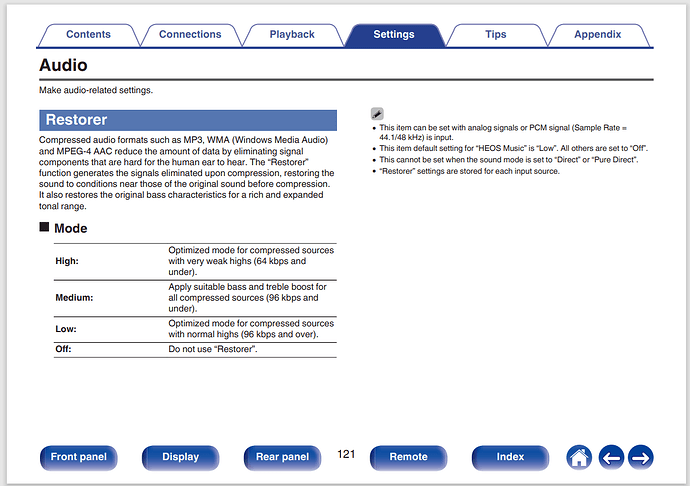What is the difference (what effect does it have on the number and correctness of tags) clearing tags before using Picard and ignoring MBID in Picard?
Once you have spent time setting the MBIDs correctly in your files you don’t need to do it again. The point is the next lookup is fast and accurate. Picard looks at the MBID and now knows what the file is.
Wiping it out just causes a waste of time and energy. Similar to wiping out good tags just wastes time and energy.
@IvanDobsky what if I only use Scan? And I never enter data into tags myself?
I don’t understand why you would bother to use Picard to identify music files if you then proceed to discard the results you learn.
Once you have an MBID - keep it. It is more accurate than a Scan for the next time you want to update any tag data on that music file.
If you have good tags, then they will be more accurate than a Scan when used with Lookup. Good tags will already note which Album that track is from. Something Scan can never do.
Scan can identify an example of a Recording - but if it is something popular that is on hundreds of compilations and reissued albums it is only tags that can identify the true source.
What if someone uses Picard for the first time and has MP3 files of unknown origin that they have never looked at?
What should be the order?
I get deja-vu here… ![]()
If I had a heap of 1000s of MP3s downloaded from dodgy sources like Limewire, etc I would split the heap.
I’d take those with good tags organised in album folders and move them to one side. I’d identify these with Lookups first as that will give best results.
I’d take those with ropey looking tags and still Lookup on them and check the results.
I’d take those with no tags but filenames and feed them through MP3Tag to copy filename to tag and then Lookup.
I’d take the crap with bad tags and use Scan if lookups were failing. I will know I’ll get an 80% success rate.
But still I would trust any MBIDs first. Some Limewire and scummy files are still well tagged. And tagging has been around for decades so even the scummiest of rips tended to half half decent tags.
Personally I’d also throw half of them out. I’d use different software to identify anything less that 256kbps and just discard them as they will sound like underwater junk on modern audio systems.
I have heaps of old cruddy MP3 files from 15-20years ago that I never returned to as they sound like crap now. Just abandoned on an old hard drive and not in my music collection. Not worth the effort to fix.
I also know there is no point in using Picard on these as I don’t know the actual album things came from. Bad tags are hard to improve anyway. Might as well just clean them up a bit with MP3Tag and leave as is.
Those few items in that heap I do want are going to be the rare stuff that a Scan will never identify as it has not been scanned before.
I knew you liked deja-vu ![]()
Short version - look at your heap. Identify the good stuff and pull it out and work on it. Ignore the crap for another day. Most of that crap is on YouTube now anyway.
One of the problems AcoustID has is people will take a collection of 10000 crap MP3 files and throw them into Picard. They then punch all the buttons wildly assuming Picard is magic. They Generate Fingerprints and hit Submit AcoustID without realising what the buttons do. This causes an almighty polluted mess in the AcoustID database.
I not saying you are doing this. But enough people have done this that means you can’t rely only on AcoustID data.
I have spent way too many hours wading around AcoustID for some artists untangling the mess in there. ![]() Scan is great but far from perfect.
Scan is great but far from perfect.
My Denon DRA-800H has a Restorer function for lower quality files.
"
Compressed audio formats such as MP3, WMA (Windows Media Audio)
and MPEG-4 AAC reduce the amount of data by eliminating signal
components that are hard for the human ear to hear. The “Restorer”
function generates the signals eliminated upon compression, restoring the
sound to conditions near those of the original sound before compression.
It also restores the original bass characteristics for a rich and expanded
tonal range.
"
So does my Yamaha and many other amps. But you can’t make anything decent out of a crap 128kbps file. Those things are a gimmick \ marketing BS. Once you have thrown out the data any attempted restore is just junk. Estimated guessed junk is still junk. No matter how good the algorithm.
It is like when you try and upscale a 640x480 image onto a 4K screen. It may make a picture that fits the screen, but it is a smeared blury mess and no substitute for the original.
The best hope for junk MP3 compression is to start going deaf and owning cruddy speakers. This is why the early headphones on iPods were so rubbish. It was so you could not tell how bad the music was. ![]()
Over a decade ago I ripped 400+ CDs to MP3 @ 320kbps VBR. Took a couple of years to complete. And then I replace my hifi system. It was painful to listen to and meant I set out never make the mistake again and started ripping to FLAC instead.
Note: “crap” is not swearing. It is a technical abbreviation for. “Compressed Recordings Are Painful” ![]()
With age, the upper limit of the audible frequency response of 20 kHz (for humans) also decreases. ![]()
